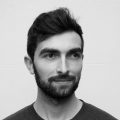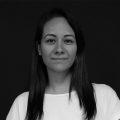DIGITAL BUILDERS
AUGMENTED REALITY FOR CONSTRUCTION

AUGMENTED REALITY FOR CONSTRUCTION
In the Latin American architecture and construction context it’s often experienced a communication problem between designers and builders. We have found an interesting opportunity where the use of augmented reality can act upon this issue and facilitate the execution of complex projects. Sometimes builders are finding difficulties in reading the designers indications and often technical guidelines are misunderstood or even skept. Now technology allows to bridge these two positions, designer and builder, where there is no need for blueprints anymore, allowing the constructors to see what they are going to build step by step. By superimposing a computer-generated image on a user’s view of the real world, it is possible to reduce the chances for mistakes and misunderstandings. The advantages of using these augmented tools are numerous, for architecture and product design, complex assembly, hand-on and safety training, and specially the fact that they allow to build complex geometries, to generate new spatial qualities, without the need of expensive robots or cnc machines. This course aim is the exploration of the intersection between design of complex geometries, augmented reality and traditional construction techniques.
IAAC Global Summer School is a full-time two weeks course, 1-14 July 2019, that provides both practical and theoretical knowledge. The program is led by expert tutors, combined with lectures by renowned professionals and academics relevant to the topics to be treated during the course. These will be broadcasted in the different node-cities, all globally connected. Participants will join a global agenda and an international laboratory at their disposal to test their design hypothesis, understanding how design conclusions derived locally can be tested and evolved globally in the different cities where other teams reside.
Global Summer School México 2019 with IAAC Global Summer School managed by the Institute for Advanced Architecture of Catalonia IAAC in collaboration with Centro de Estudios Superiores de Diseño de Monterrey CEDIM, is connecting education and building industry by developing new applications for augmented reality in the construction sector. At the GSS México the participants will be introduced to computational design and augmented fabrication processes to merge the digital world and the built environment. The main digital platform will be Rhino/Grasshopper while the plugin Fologram will be used to establish the AR experience. By working with Microsoft HoloLens, physical prototypes will be constructed in scales 1:1. All participants will be assisted during the whole course by the tutors on digital and physical prototyping sessions.
See below previous projects realized with Fologram. Visit Fologram

Djordje Stanojevic received his bachelor’s degree in Architecture from the University of Venice (IUAV) in 2011. Winner of the Touch Fair Architecture Competition, Djordje has been involved in the computational design and innovative solutions for exhibition spaces. In 2015 he completed his Integrative Technologies and Architectural Design Research Masters (ITECH) at the University of Stuttgart, both at the Institute for Computational Design and Construction (ICD) and the Institute of Building Structures and Structural Design (ITKE). He was involved in the system development, fabrication and construction of the ICD/ITKE Research Pavilions 2013-14 and 2014-15, merging engineering, robotics, digital manufacturing, material science and biology. In his professional activities he integrates practice, education and research in design along a strong interdisciplinary trajectory. Djordje is the cofounder of ME-ST and ALTERAT, two design practices focused on complex design and innovative fabrication strategies. He taught and continues teaching at various educational programmes such as the Institute for Advanced Architecture of Catalonia (IAAC), Universidad Autónoma De Nuevo León (UANL), Universidad de Monterrey (UDEM) and the Centro de Estudios Superiores de Diseño de Monterrey (CEDIM) where is currently the director of the Industrial Design department. Between education and practise he has been developing integrative design strategies with multiscalar approaches and material driven design criterias materialized with full scale pavilion prototypes.

David Durán is an architect, co-founder of NONAME and the academic Director at the CEDIM Architecture department. His academic research stems a transdisciplinary design approach where architecture, art, business & technology meet to promote architectural innovation. David studied at Polytechnic University of Catalunya, ETSAB, where he also obtained his PhD focusing on the Technological Innovation in Design. Prior to founding NONAME he was the Academic Director at the Architecture Postgraduate Program from Anahuac México Norte University. David taught at GSD Harvard, UMSNH, UANL, IBERO, TEC DE MONTERREY, La Salle. He was a Senior Architect at Toyo Ito & Associate Architects, an he is the co-director of Couture-LAB. He is participating in different forums for young designers & entrepreneurs, introducing his radical approach in stepping out the confort zone, adivising on how to find what designers love and why they should never give up.

Yessica Mendez holds a Master degree in architecture from the Institute for Advanced Architecture of Catalonia (IAAC) where she was part of the Computation, Bio-materials and Architecture research group. Her thesis project “Design for ageing buildings“ is currently exhibited at the Méxican consulate in Barcelona and was published at the International Forum Intelligent Cities / Resilient Landscapes ADD Genova 2017. Yessica has more than four years experience of work as an architect, being awarded with an honorable mention on Landscape and Public Space category at the XVII Bienal Regional de Arquitectura of Nuevo León (México). From 2012 to 2017 she taught at the Universidad Autónoma De Nuevo León (UANL). From 2017 she continued teaching at Centro de Estudios Superiores de Diseño de Monterrey (CEDIM), where one year later she became the Academic Coordinator of the Architecture and Interior Design department. Currently her research at CEDIM focuses on intelligent materials and environmental design. Yessica is cofounder of ME-ST, a professional practise where she focuses on novel environmental design and fabrication processes.
The GSS19 México will be hosted at the Centro de Estudios Superiores de Diseño de Monterrey CEDIM, right next to the Huasteca mountains. Cedim is a great playground for designers counting on a fully equipped laboratory with cnc milling machine, laser cutter, 3D printers, woodworking and metalworking tools and machines.
Address: Antiguo Camino a la Huasteca 360, Mirador de la Huasteca, 66354 Santa Catarina, N.L., México.
IAAC GSS is open to creative and innovative people who are interested in fields such as architecture, urban planning, digital fabrication, design, etc., searching for a multidisciplinary experience in an international environment. No previous skills are required, although CAD design, programming and digital fabrication skills are welcome. The official language of the course is English.
After the course, the participants will have gained theoretical and applicative knowledge about advanced design strategies. They will be familiar with parametric software, data visualization and use of digital machines. The last day of course participants will join a presentation of developed projects reviewed by a renown jury and will receive a Global Summer School Diploma.
Each participant is responsible to investigate which documents are required via the embassies in their country of origin. The school will provide a confirmation letter regarding the participation to the course, and will assist where possible the visa process.
Fee for Mexico is 13700 MXN$ and includes all material costs needed for the course. No additional registration fee is required. Flight tickets, accommodation and food are not included in the fee. Each participant should bring his/her own computer with the software installed. Further details about the software will be given to the participants upon acceptance.
In order to register to the Global Summer School, participants need to submit the online application form, where they will be asked to fill their personal details and to upload a CV. Portfolio is not required. GSS19 dates are from 1-14 of July 2019 and applications are open until the end of May.
For any further information please contact: [email protected]
![]()
